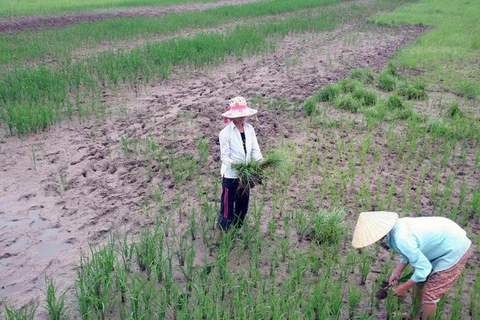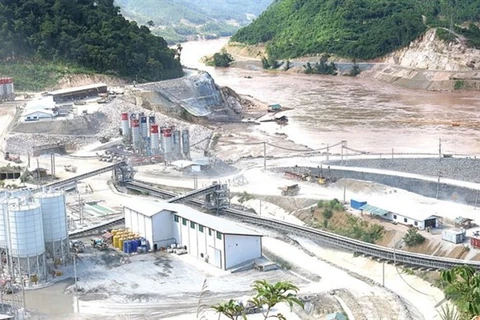 An integrated lotus – eco-tourism model is one of the flood-based livelihood models adopted by farmers in Dong Thap province (Photo: VNA)
An integrated lotus – eco-tourism model is one of the flood-based livelihood models adopted by farmers in Dong Thap province (Photo: VNA) Dong Thap (VNA) - The International Union for the Conservation of Nature has launched a pilot project for flood-based livelihoods that will enhance the water retention capacity of the Mekong Delta.
The project will train and assist farmers in the delta’s Dong Thap, Long An and An Giang provinces to adopt financially attractive, low-risk, flood-based livelihoods as alternatives to unsustainable third rice crops.
After three years, these areas can restore around 6.7 million cubic metres of flood water per year, according to the IUCN, which expects an up-scaling of the project to help restore up to 4 billon cubic metres of water retention that was lost between 2000 and 2011.
To cost 550,000 USD, it will cover agricultural production on 450ha for three years, comprising 150ha of lotus cultivation in Thap Muoi district of Dong Thap province, 150ha for integrated lotus farming-eco-tourism in Tan Hung district of Long An and 150ha for rice-aquatic farming in Tri Ton district of An Giang.
Vo Thanh Ngoan, deputy director of Dong Thap province's Department of Agricultural and Rural Development, said, at the moment local farmers are implementing some [flood-based livelihood] models such as rice – prawn, rice – fish and rice – lotus.
But they are implemented on a small scale and faces many challenges, he said, adding that “the issues of food safety and environmental protection have also urged us to adopt more sustainable integrated models.
According to Dr Andrew Wyat, the IUCN’s Mekong Delta Programme Manager, implementing a programme for water retention is complex and involves multiple sectors and stakeholders.
Flood-based livelihoods are only one facet of the challenge but arguably one of the most important since it involves some of the most vulnerable stakeholders, the farmers whose lands will act as flood retention areas. Their participation and involvement in developing a water retention strategy is crucial to the success of the idea.
If the project can demonstrate solutions for the technical and market challenges, farmers will be able to benefit by profiting from the floods. The approach of using nature-based solution is now a key direction of the Vietnamese government which is reflected in Resolution No.120, he said.
Prime Minister Nguyen Xuan Phuc approved Resolution No.120 on sustainable development for the Mekong Delta last year as part of efforts to cope with climate change.
At a local level, Dong Thap is working on a feasibility report for a project to improve flood drainage, develop stable livelihoods and adapt to climate change.
To cost 664 billion VND (29.1 million USD), it will be funded by official development assistance, public money and private investors.-VNA























